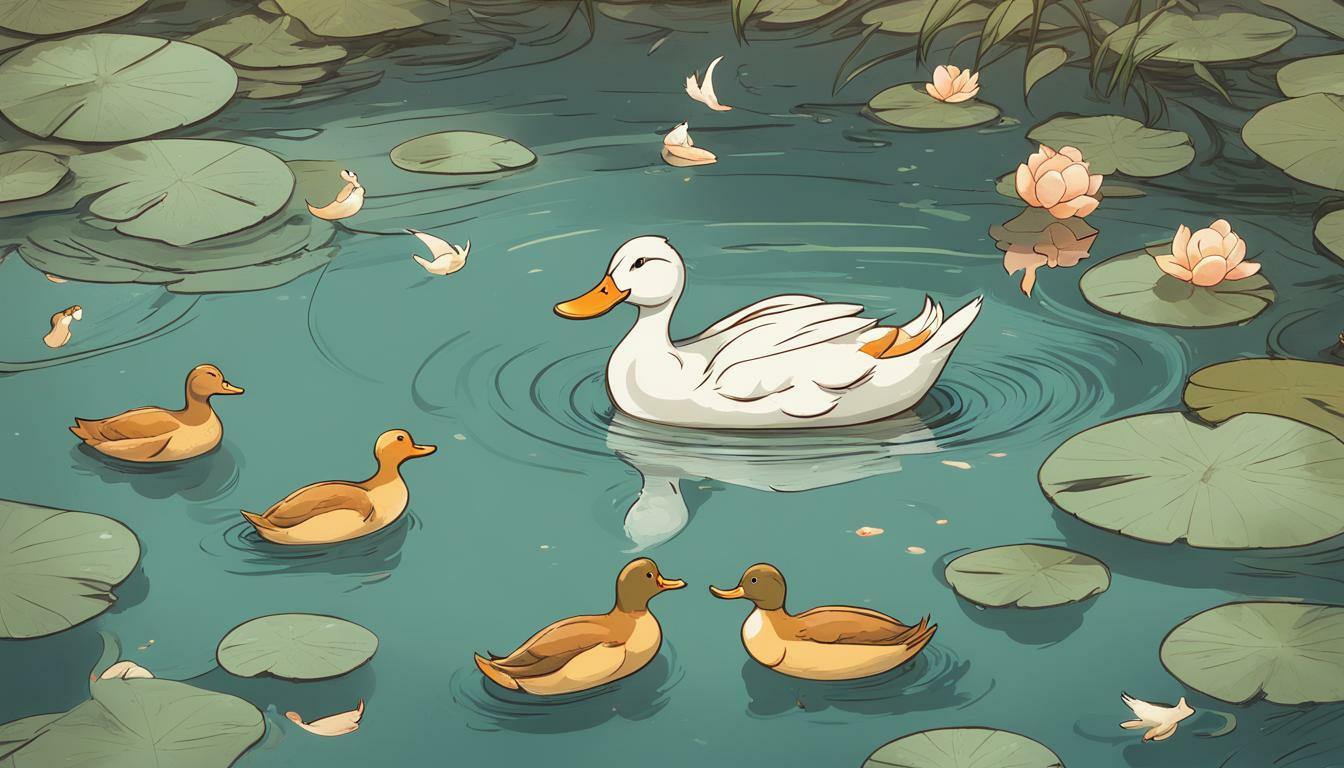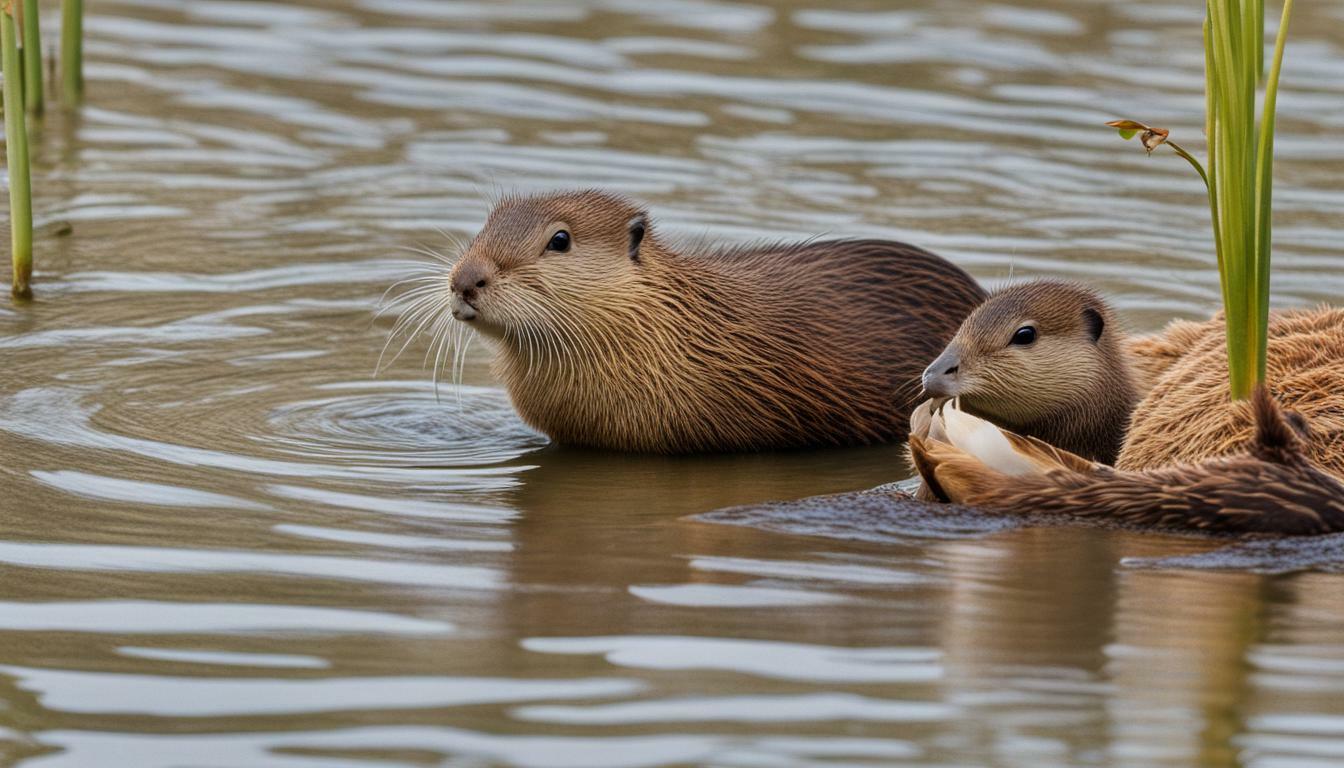Do Ducks Eat Koi Fish? Exploring Duck Dietary Habits

Table of content:
Koi fish are colorful, ornamental versions of common carp that are popular in outdoor ponds and water gardens. With their bright colors and large sizes, koi stand out against other pond fish. This distinct look makes them appealing additions to ponds, but it can also attract unwanted attention from predators like ducks.
If you have both ducks and koi in your pond, you may wonder if ducks will eat your prized koi fish. Ducks are opportunistic feeders and will eat small fish, frogs, and aquatic invertebrates. Read on to learn more about the duck species that pose a threat and steps you can take to protect your koi fish.
Do Mallard Ducks Eat Koi Fish?
The mallard is one of the most common duck species worldwide. Mallards dabble in shallow water to find food, tipping forward to submerge their head and neck underwater. They omnivorous, feeding on aquatic plants, seeds, grains, snails, tadpoles, small fish, and aquatic insects.
Mallard ducks will certainly eat small koi if given the chance. Their natural diet includes small fish and koi less than 5 inches long would make easy targets. Larger koi are generally safe from mallards, but it’s best not to chance it.
To keep your koi safe, pond owners should discourage mallards from inhabiting the area. Scarecrows, predator decoys, and wire grid covers can help deter them from landing. You can also train mallards to avoid your pond by chasing them off immediately whenever they land.
What Types of Ducks Eat Koi Fish?
While mallards are the most widespread duck species, there are several other ducks that can threaten your koi. Dabbling ducks that feed near the water’s surface pose the greatest danger since they actively hunt small fish and aquatic invertebrates.
The most likely duck culprits include:
- Mallards
- Muscovy ducks
- Domestic ducks
- Wood ducks
- Mandarin ducks
These ducks all have varied diets that include small fish, insects, plants, and seeds. They will readily eat koi fry and juveniles that fit within their bill size limitations.
Diving ducks that feed deeper underwater are less likely to pursue koi. Examples include canvasbacks, redheads, ring-necked ducks, and ruddy ducks. However, they may still eat koi eggs or other pond wildlife.
To protect koi of all sizes, pond owners should exclude all types of ducks from inhabiting or landing in their ponds. Identifying duck species that visit your pond will help you target deterrents effectively.
How Do I Stop Ducks from Eating My Koi Fish?
If ducks have already discovered your koi pond, take steps to make it less attractive and deny them access. Here are some duck deterrent methods to try:
Install Fencing
Fencing provides a physical barrier to keep ducks out of the pond. For best results, use a fence at least 30 inches high made of vinyl, metal, or high-grade plastic mesh. Avoid chicken wire since ducks can easily become trapped. Bury the bottom 6 inches of the fence to prevent ducks from crawling underneath or install an L-shaped fence.
Use Scare Devices
Motion-activated sprinklers, flashing lights, and sounds can startle ducks and discourage landing. Devices like fake alligators, rubber snakes, and predator decoys also simulate threats. For best results, use a combination of stimuli and move devices frequently so ducks don’t become accustomed.
Apply Repellent Gel
Non-toxic bird repellent gels make surfaces uninviting to ducks. Apply to rocks, railings, edges, and anywhere ducks frequently land. Reapply after rain.
Train Ducks to Leave
Actively scare away ducks every time they land on your pond so they learn it’s not a safe place. Use loud noises, clapping, spraying from a hose, or chasing them until they take flight. Be consistent and persistent.
Remove Duck Attractants
Clean up fallen leaves or debris on the pond surface. Remove duck food sources nearby, such as spilled bird seed or grass clippings. Install a pond cover or netting to prevent ducks from swimming and dabbling.
Add a Swan or Goose Decoy
Ducks will avoid areas with decoy swans or geese since they are territorial birds. Select a large, realistic decoy and move it around occasionally for best results.
Will Muscovy Ducks Eat Koi Fish?
Muscovy ducks are large ducks native to Mexico, Central, and South America. They have been introduced in some areas of North America, Europe, Asia, and Africa.
Muscovys are aggressive birds with carnivorous tendencies. They feed on small reptiles, amphibians, insects, plants, and fish. Muscovy ducks kept with ponds readily eat koi juveniles and eggs. Their sharp claws can also injure adult koi.
Muscovy ducks are resilient and more difficult to deter than other ducks. High fences may be the only effective physical barrier to protect koi ponds. Ponds should also be covered with mesh when muscovys are in the area.
Do Wild Ducks Eat Koi Carp?
In the wild, juvenile koi carp (under 12 inches long) fall prey to a variety of predators including herons, otters, mink, turtles, and ducks of all kinds. Mallards, wood ducks, and other dabbling ducks consume small wild koi with ease.
Koi carp originating from Asia are now an invasive species in many parts of the world due to pond owners releasing them. When koi gain access to lakes, rivers, and streams, their eggs and fry become an abundant food source for wild ducks.
Wild koi carp become less vulnerable to duck predation as they mature. Their dull brown camouflage also improves their odds of avoiding duck detection in natural settings. Properly constructed pond habitats effectively exclude wild ducks and keep captive koi safe.
Do Domestic Ducks Eat Koi?
Domestic duck breeds include the familiar Pekins, Calls, Cayugas, Runners, and more. Most domestic ducks originate from mallard stock and exhibit similar behaviors. They are social, hardy, and generally non-aggressive ducks.
Domestic ducks kept as backyard pets have frequent access to backyard ponds. Their omnivorous diet and dabbling habits pose a significant risk to koi unless preventative steps are taken. Owners must be vigilant to stop ducks from snacking on juvenile koi and eggs.
Well-fed domestic ducks are less likely to hunt for supplemental food. Provide adequate duck food away from the pond and use deterrents to discourage pond access. Supervise duck and koi interactions until the ducks learn boundaries.
Are Koi Fish Safe With Ducks?
Koi health and safety cannot be guaranteed when ducks share the same pond environment. Ducks view koi as prey and will consume them if given the opportunity.
Juvenile koi and eggs are particularly vulnerable since they fit within the size range of a duck’s throat. Even adult koi may be injured by ducks attempting to handle or pursue them.
Mitigate the risk to koi by using pond deterrents to make areas inaccessible to ducks. Monitor ponds frequently for signs of duck intrusion and damage to koi. Remove duck attractants around the pond perimeter.
With vigilant monitoring and deterrents, koi and ducks can coexist safely in adjoining habitats. But allowing ducks free access to inhabited koi ponds is an open invitation to disaster. Their instincts as opportunistic hunters inevitably put koi at risk.
Final Thoughts
Koi fish provide beauty and serenity to backyard ponds, but their bright coloring can attract ducks looking for an easy meal. Several duck species will prey on juvenile koi and eggs if given the opportunity.
Fortunately pond owners can implement various deterrents to convince ducks to look elsewhere for food. With some time and effort, koi and ducks can safely coexist without one becoming a meal for the other. Stay vigilant and use smart pond management techniques to protect your prized koi from duck predation.
Welcome. I’m Adreena Shanum, the proud owner of this website, and I am incredibly passionate about animals, especially poultry. I founded adreenapets.com as a labor of love, stemming from my desire to share my knowledge and experiences with poultry enthusiasts worldwide.




